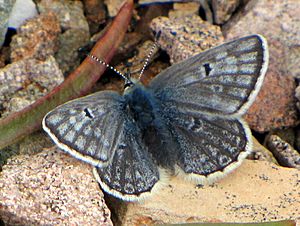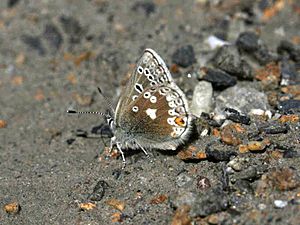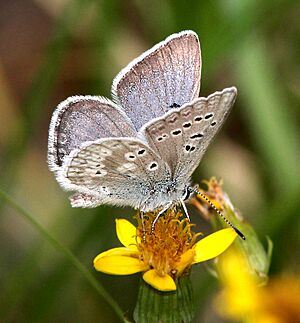Arctic blue facts for kids
Quick facts for kids Arctic blue |
|
|---|---|
 |
|
| A. g. labrador, male, Cape Bonavista, Newfoundland and Labrador | |
 |
|
| Scientific classification | |
| Kingdom: | |
| Phylum: | |
| Class: | |
| Order: | |
| Family: | |
| Subfamily: |
Polyommatinae
|
| Genus: |
Agriades
|
| Species: |
A. glandon
|
| Binomial name | |
| Agriades glandon (de Prunner, 1798)
|
|
| Synonyms | |
|
|
The Arctic blue (Agriades glandon) is a beautiful species of butterfly. It is also known as the Glandon blue. This small butterfly belongs to the family Lycaenidae, which includes many 'blue' butterflies. You can find it in different parts of Eurasia and North America.
Contents
Where Do Arctic Blue Butterflies Live?
The Arctic blue butterfly lives in many cool places around the world.
Arctic Blue in North America
In North America, you can find it from Alaska all the way east to Newfoundland. It also lives in the mountains, going south to states like Washington, northern Arizona, and northern New Mexico.
Arctic Blue in Europe and Asia
In Europe, it likes high mountains such as the Pyrenees and the Alps. You can also spot it in the far northern parts of Europe. It lives in Russia, including places like Siberia and Kamchatka.
What Does the Arctic Blue Butterfly Look Like?
The Arctic blue butterfly is quite small. Its wingspan is usually between 17 and 26 millimeters. That's about the length of a small coin!
Male and Female Butterflies
- Males: The top side of a male's wings is often a shiny silver, steely blue, or light blue color. The edges of their wings tend to be more brown.
- Females: The top side of a female's wings is mostly brown. However, they might have a slight blue tint near the body.
Wing Patterns
Both male and female Arctic blue butterflies usually have small, dark spots on their wings. These spots are sometimes surrounded by white. If you look at the underside of their front wings, you'll see black dots with white edges. The underside of their back wings has striking white spots. Sometimes, there are also orange dots on the grayish-brown background.
Arctic Blue Butterfly Life and Food
These butterflies are active for part of the year.
When They Fly
The Arctic blue butterfly flies from the middle of May until September. The exact time depends on where they live.
What They Eat
The caterpillars of the Arctic blue butterfly eat different kinds of plants. Some of their favorite food plants include:
- Astragalus species, like Astragalus alpinus
- Androsace species, like Androsace bungeana
- Soldanella
- Diapensia lapponica
- Vaccinium
- Saxifraga species, like Saxifraga oppositifolia
Different Types of Arctic Blue Butterflies
Scientists have found many different types, or subspecies, of the Arctic blue butterfly. These subspecies often look a little different or live in specific areas.
Here are some of the known subspecies:
- A. g. glandon (found in the Pyrenees and Alps mountains)
- A. g. aquilo (found in Arctic Europe and Arctic Canada)
- A. g. franklinii (found in Alaska)
- A. g. wosnesenskii (found in parts of Siberia and Kamchatka)
- A. g. rustica (found in Colorado)
- A. g. aquilina (found in the polar tundra of Siberia)
- A. g. megalo (found in British Columbia)
- A. g. bryanti (found in Alaska and Northwest Territories)
- A. g. lacustris (found in Manitoba)
- A. g. centrohelvetica (found in Switzerland)
- A. g. punctatus (found in Arizona)
- A. g. cassiope (found in California)
- A. g. kelsoni (found in California)
- A. g. ustjuzhanini (found in Mongolia)
- A. g. saluki
- A. g. brutus (found in the eastern Sayan Mountains)
- A. g. rubini (found in eastern Kazakhstan)
- A. g. batchimeg (found in Mongolia)
- A. g. labrador (found in Labrador and Newfoundland)
Scientists are still studying how all these different types are related to each other. Sometimes, what one scientist calls a subspecies, another might call a separate species!


